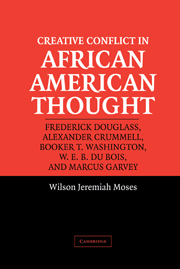Book contents
- Frontmatter
- Contents
- Acknowledgments
- Preface: Struggle, Challenge, and History
- 1 Introduction: Reality and Contradiction
- FREDERICK DOUGLASS: THE INDIVIDUALIST AS RACE MAN
- ALEXANDER CRUMMELL: THE ANGLOPHILE AS AFROCENTRIST
- 5 Alexander Crummell and Stoic African Elitism
- 6 Alexander Crummell and Southern Reconstruction
- 7 Crummell, Hero Worship, Du Bois, and Presentism
- BOOKER TALIAFERO WASHINGTON: THE IDEALIST AS MATERIALIST
- W. E. B. DU BOIS: THE DEMOCRAT AS AUTHORITARIAN
- MARCUS MOZIAH GARVEY: THE REALIST AS ROMANTIC
- CONCLUSION: RESCUING HEROES FROM THEIR ADMIRERS
- Index
7 - Crummell, Hero Worship, Du Bois, and Presentism
Published online by Cambridge University Press: 07 November 2009
- Frontmatter
- Contents
- Acknowledgments
- Preface: Struggle, Challenge, and History
- 1 Introduction: Reality and Contradiction
- FREDERICK DOUGLASS: THE INDIVIDUALIST AS RACE MAN
- ALEXANDER CRUMMELL: THE ANGLOPHILE AS AFROCENTRIST
- 5 Alexander Crummell and Stoic African Elitism
- 6 Alexander Crummell and Southern Reconstruction
- 7 Crummell, Hero Worship, Du Bois, and Presentism
- BOOKER TALIAFERO WASHINGTON: THE IDEALIST AS MATERIALIST
- W. E. B. DU BOIS: THE DEMOCRAT AS AUTHORITARIAN
- MARCUS MOZIAH GARVEY: THE REALIST AS ROMANTIC
- CONCLUSION: RESCUING HEROES FROM THEIR ADMIRERS
- Index
Summary
Saunders Redding once observed that the passing of Frederick Douglass in the spring of 1895 marked the end of an era in African American political ideology and cleared the way for Booker T. Washington's assumption of the race's symbolic leadership. Washington's Atlanta Exposition Address, delivered later that year, marked a departure from the crusading idealism of the abolitionist era in the direction of a materialistic and occasionally servile pragmatism. The manifesto was, nonetheless, initially hailed by the young W. E. B. Du Bois as “a phenomenal success” and “a word fitly spoken.” Edward W. Blyden sent Washington his pontifical congratulations on his “wonderful address,” calling him the new “Father of his country” and adding that “your work in some respects” was greater than his, for while George Washington freed one race from foreign domination, Booker T. Washington was destined “to free two races from false views of life.” William J. Cansler, a black teacher in Knoxville, Tennessee, bestowed a more realistic distinction on Washington, declaring, “Upon you has fallen the mantle of the illustrious [Frederick] Douglas[s], to you we accord the title as leader, all intelligent and thinking colored men will follow.”
The first stirrings of the American Negro Academy in 1896 betokened an implicit denial of both the symbolic leadership of Douglass and the belief that his mantle should be passed on to Washington.
- Type
- Chapter
- Information
- Creative Conflict in African American Thought , pp. 121 - 138Publisher: Cambridge University PressPrint publication year: 2004



